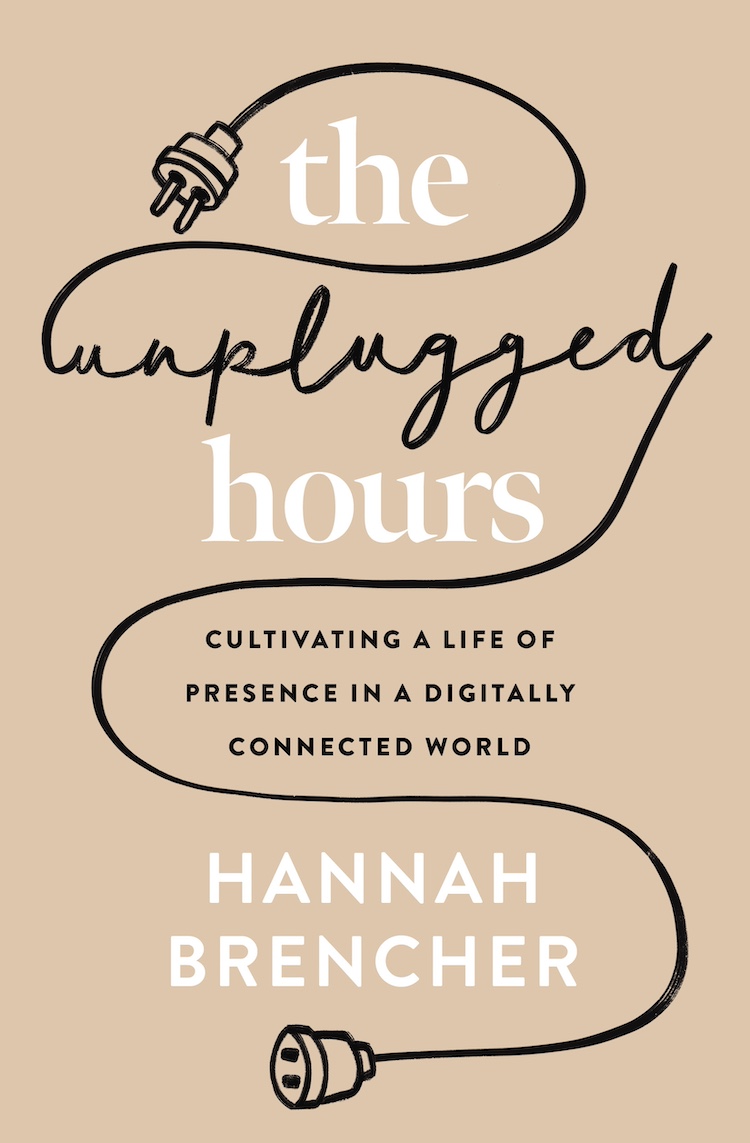Disconnecting to Reconnect: A Faithful Approach to Mental Health with Faith Broussard Cade & Hannah Brencher
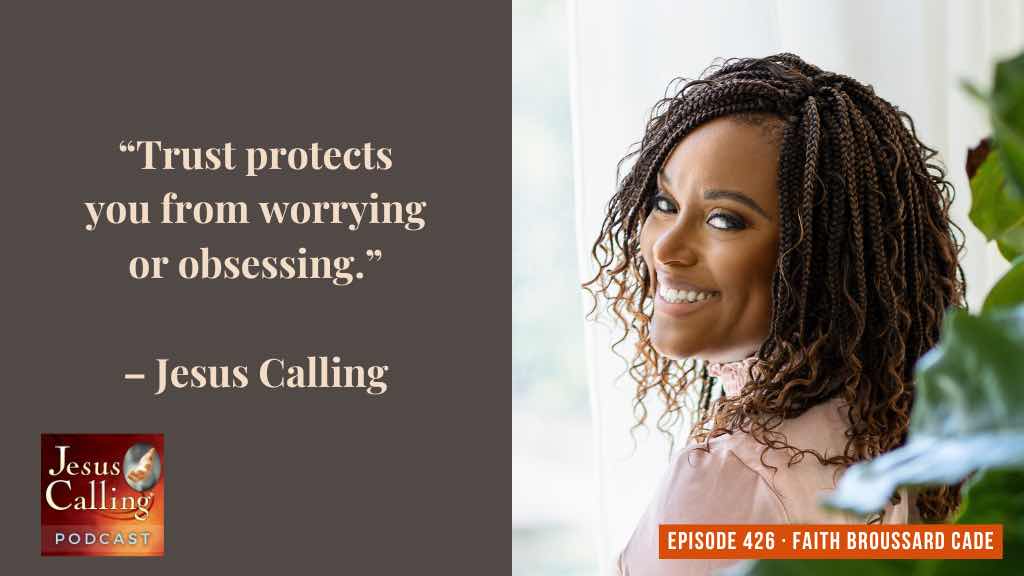
* This episode mentions suicide and depression and may not be suitable for all listeners. *
Faith Broussard Cade: My worth is inherently mine simply because I’m a human being, because I am a child of God, and I was born with worth and value. And so I am worthy and I am enough no matter what I accomplish. That I have done enough, no matter what I accomplish, is one of the main messages that I’ve been able to process and digest through my writing.
Disconnecting to Reconnect: A Faithful Approach to Mental Health with Faith Broussard Cade & Hannah Brencher – Episode #426
Narrator: Welcome to the Jesus Calling Podcast. In an era where the pressures of modern life can feel overwhelming, two remarkable stories offer a unique perspective in our increasingly digital world.
Our first guest, mental health counselor and advocate Faith Broussard Cade, embarked on a path to self-discovery following a traumatic brain injury. Diagnosed with post-concussive syndrome after a severe car accident, her journey underscored the critical importance of self-care and the necessity of prioritizing mental well-being in today’s fast-paced world.
Later in the episode, we’ll hear from Hannah Brencher—an author and educator—who delves into the impact of constant digital connectivity on mental health and personal well-being, drawing from her own experiences. Hannah shares her journey toward unplugging, which began as a personal revelation on her birthday and led her to set a goal of 1,000 hours of disconnection over the course of a year.
Let’s begin with Faith’s story.
Faith Broussard Cade: My name is Faith Broussard Cade. I am a mental health counselor and advocate. I am also an author and I just try to be a helper in every sense of the word. I am currently living in Atlanta with my husband and two children, and I spend a lot of my time sharing words of affirmation with others via social media—Instagram and Facebook—but also providing counseling services to my clients.
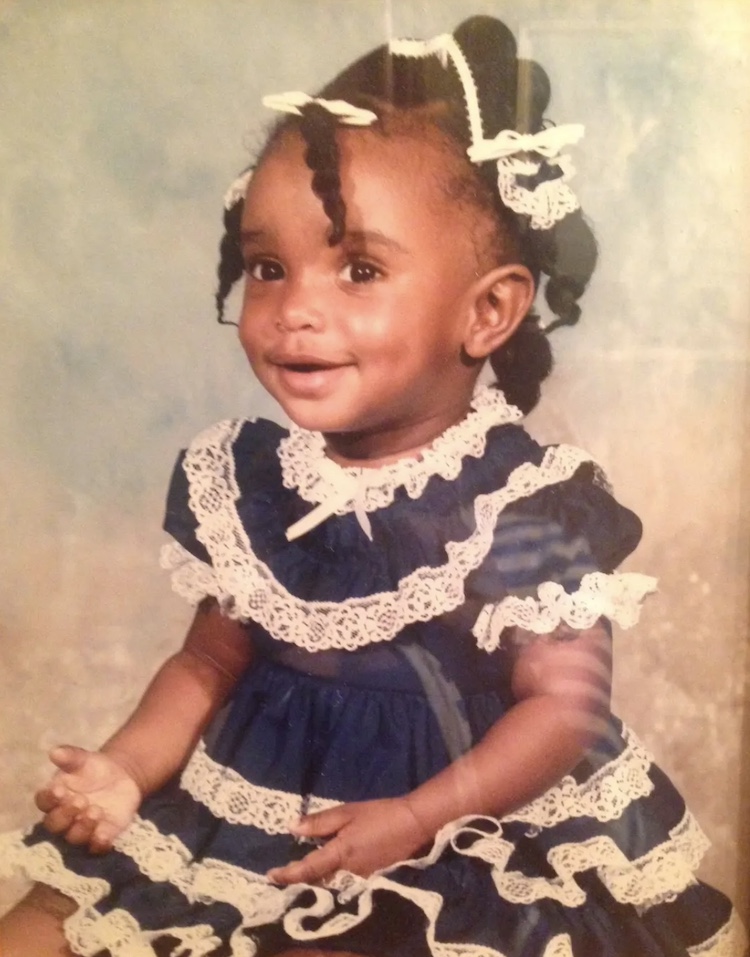
I am a small town Louisiana girl, born and raised in New Iberia, Louisiana. I spent a lot of time as a child outside, but I also spent a lot of time reading. My mom was a huge proponent of education. My parents made lots of sacrifices in order to afford to send myself and my siblings to private Christian schools to get the best education that we possibly could. And that was always reinforced at home. So if I go back to my childhood home right now, there are multiple built-in bookshelves with all of the books that I ever owned as a child, whether it was like Baby-Sitters Club or Hardy Boys or The Boxcar Children, Dr. Seuss, you name it, it’s there. And also, writing was something that was very important in my family. I had every journal, every diary you could possibly imagine. So from a very young age, reading and writing was a source of comfort.
In my mind, I thought that I might be a journalist or do something in journalism. I don’t think I ever considered that I would be a mental health professional. I was, however, always the friend that everyone came to for advice or guidance or just to bounce ideas off of. I went to undergrad at the University of the South in Sewanee, Tennessee, and majored in English and French Studies. My senior year, I’m trying to figure out, like, What am I doing after this? It’s when I thought, Well, you know what? Maybe there is something to this counseling thing. It’s something that’s always been inside of me. Maybe it’s something I should pursue. And so then that led me to grad school at Vanderbilt for human development counseling, and then into my career as a school counselor and now as a private mental health counselor.
Life Can Change in the Blink of an Eye

I was working as a school counselor here in Atlanta. I was driving to work the morning of January 9th, 2018, stopped at a stoplight, and out of nowhere was hit from behind by a tractor trailer at full speed.
And from that motor vehicle accident, I sustained a concussion and a traumatic brain injury. I didn’t hit my head on anything. I had my seatbelt on, like, I wasn’t bleeding or anything like that. And so the initial thoughts that I had were, Well, I guess I’m okay. I guess I’m fine. I did have a bit of a headache and body aches, which I thought were simply from whiplash. I didn’t really think anything of it. I remember taking the rest of the week off to just kind of rest and get my bearings and fully planned to go back to work the next week, which I did. But by the time I did that, the headaches and the body aches had not gone away. The headaches turned into migraines, and then I started to have some short term memory issues and some really intense sensitivity to light and sound. Going into a grocery store or restaurant or something like that, where there’s these big fluorescent lights, there’s background music playing, and multiple conversations being had throughout the store, was completely overstimulating and overwhelming for me to the point that there were several times I would abandon my entire cart of whatever it was I had with me and just bolt out the door. I felt like I was going to climb out of my skin.

But it progressively got worse and worse and worse. And then I was having trouble concentrating and focusing and things just weren’t getting better. In the meantime, my leave time that I had accrued for work had been exhausted. And so the school system gave me an ultimatum, like, either you come back to work cleared by your doctors, you resign, or we terminate you. So I had to resign.
And it was then that I actually found a neurologist who took my concerns and my symptoms seriously and diagnosed me with post-concussive syndrome and a traumatic brain injury, even though I had not hit my head. The concept was essentially that the impact of the hit was so intense that it caused my neck to snap forward and rattled my brain inside of my skull. And so my brain was bruised in certain places. So then began the process of recovery with physical therapy and all sorts of other clinicians to attempt to recover.
Small Notes with a Big Impact
I think up until this accident happened, and I was forced to really prioritize my own physical and mental health… even though I worked as a school counselor, I was doing a subpar job at best of taking care of myself in that way.
But throughout the process of recovery, very early on after I was diagnosed, I had my neurologist essentially tell me, “Your brain needs time to heal, and in order for your brain to heal, that means it can’t be doing and thinking about and processing a whole bunch of things. It doesn’t need to be trying to figure out logistics of life and how to show up for other people, and fit that into your schedule. It needs just to be you sitting, either reading for fun or watching mindless TV. You cannot continue to set yourself on fire for everybody else. Because if you do, you’ll never recover from this.” And so I had a decision to make. Do I keep up the facade that I’ve always kept of being the superwoman who can always do everything and be everything to everyone? Or do I give up that facade for the hope of being able to have a future?
“I had a decision to make. Do I keep up the facade that I’ve always kept of being the superwoman who can always do everything and be everything to everyone? Or do I give up that facade for the hope of being able to have a future?” – Faith Broussard Cade

I had my husband, my daughter was three years old, and I made the decision that I wanted to have a future and wanted to have a life with them where I wasn’t in debilitating pain or in such a low place mentally and physically that I couldn’t show up for myself or for the people that I loved. At the time, money was very tight. So obviously, I had lost my job. My family had gone down from two incomes to one, and we could not afford any kind of extra treats or trendy self-care or spa days or luxury vacations or any of that kind of stuff that people promote as self-care these days. I had to figure out how to do self-care in a consistent and sustainable way for me. And what worked for me with very limited income. I knew that writing had always been therapeutic and healing for me. And so I just came up with the idea, like, Maybe writing something will trigger some sort of healing journey for me. And so that’s when I decided I’ll challenge myself to a fifteen day self-love challenge. I would get some pens and some little torn squares of paper, and I’d write myself a positive affirmation five minutes a day, every day for fifteen days. And I would post it on Instagram for accountability because I don’t like to disappoint people.

I was in terrible pain. I did not feel well. I did not want to show up. I did not want to get out of bed. I did not want to do any of the things that I needed to do. And yet, I chose to do something, even though it seemed small, or minute, at the time.
What was supposed to be fifteen days of me kind of jump-starting my own healing journey has now turned into six and a half years of writing notes and encouraging this community collective healing journey for a lot of other people, not just myself.
“What was supposed to be fifteen days of me kind of jump-starting my own healing journey has now turned into six and a half years of writing notes and encouraging this community collective healing journey for a lot of other people, not just myself.” – Faith Broussard Cade
I know social media and the internet gets like a bad rep for being toxic and addictive and harmful to people. And that is absolutely true in certain spaces and in certain ways. At the same time, I have seen it be the exact opposite in my little Instagram community. I remember within maybe the first couple of weeks that I had started writing these, I had one woman send me a DM saying that she had been following me and reading my notes, and that they were so encouraging for her, that they allowed her to realize how she had been manipulated in a very toxic and abusive relationship for the past twenty-five years and how my notes gave her the courage to not only see that, but advocate for herself and walk away from that abusive relationship.
I remember getting a message from someone saying, “I’ve been in a very dark place. I’ve been very depressed, not taking care of my mental health. And I just had decided I didn’t want to be here anymore. I hadn’t told anyone, and I didn’t plan on it, but I told myself that—I was planning to self-harm and I was planning to take my life—if I opened Instagram and I saw something that made me feel seen or made me feel heard, understood, something that made me feel like I wasn’t alone, then I would take the steps to get healthy mentally. That I would seek out the resources that I needed to take care of myself. And when I opened my feed, your note was the first thing that popped up. And so thank you for saving my life.”
Divine Downloads
When I started this journey, I started writing these [notes], but I always tell people they don’t come from me. They are literally my divine downloads is what I call them. I don’t make them up. I feel like God just drops them into my brain or in my heart at any given time. I could be driving, I have to pull over and write it down. I could be in the middle of something. One of my favorites is,
“I found my hero. She’s been inside of me the entire time, and I am so proud of who she has become.” – Faith Boussard Cade
I remember writing that one several years ago at a time when I was dealing with some major changes in life, in life seasons. Sometimes the people that have always been with you aren’t meant to continue on your journey with you. And that doesn’t make the pain or the shift any less difficult or hurtful. I remember writing that at that time because part of me started to feel like, Maybe there’s something wrong with me, or, There’s something about me that is not good enough. Maybe if I had been more of (fill in the blank), this relationship would not have shifted or ended.
I have realized that the things that I felt like I was trying to be or imitate about other people or trying to be the best of whatever it was for them, I already had inside of me. But just because it’s not a good fit for someone else doesn’t negate the goodness–the innate goodness–of who I am and who I try to be, and how I try to show up for others.
“Just because it’s not a good fit for someone else doesn’t negate the goodness–the innate goodness–of who I am and who I try to be, and how I try to show up for others.” – Faith Boussard Cade
I have had so many people send me messages or make comments that, “You don’t shove spirituality down my throat. But in just the way that you write your messages, in the love and compassion that is wrapped up in them, I know that you have to be a very spiritual person. Like, I can just feel it.” That’s something that strengthens my faith and encourages me to continue to do things the way that I’m doing them, to show people love and empathy and grace and compassion in a way that they can receive it, that doesn’t feel forced or or obligatory in any way.
Starting the Day Off Right
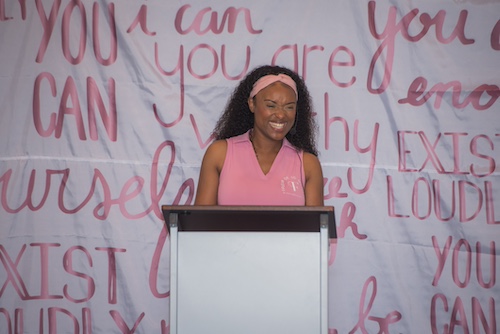
Spending time with God for me is therapeutic. I have a one year Bible that I read where the Bible is split up into sections for all 365 days of the year. If I don’t start with that, and with my Jesus Calling or with some other sort of devotional and my gratitude journal, my day just inevitably feels different from the start. And I think it’s because as humans, we are kind of flailing along in this life experience, and we oftentimes need an anchor to help us feel grounded. And for me, connecting with God on a daily basis is my anchor.
No matter what is going on, no matter what world tragedies are happening, or no matter what I’m struggling with, if I connect with God on a daily basis, the stuff around me might not be okay, but it is well with me. It’s well with my heart. It’s well with my soul. It’s well with my mind.
Jesus Listens, June 3rd:
God of grace,
I come to You for understanding since You know me far better than I know myself. You comprehend me in all my complexity; no detail of my life is hidden from You. Yet I don’t need to fear Your intimate awareness of me because I know that You view me through eyes of grace. Lord, I want the Light of Your healing Presence to shine into the deepest recesses of my being—cleansing, healing, refreshing, and renewing me.
Help me to trust You enough to accept the full forgiveness that You offer me continually. This glorious gift cost You Your Life, and it is mine for all eternity! I’m grateful that forgiveness is at the very core of Your abiding Presence. You assure me through Your Word: “I will never leave you nor forsake you.”
When no one else seems to understand me, I can simply draw nearer to You—rejoicing in the One who understands me completely and loves me perfectly. As You fill me with Your Love, I long to become a reservoir of love that overflows into the lives of other people.
In Your lovely Name, Jesus,
Amen
Narrator: To learn more about Faith Broussard Cade, visit www.fleurdelisspeaks.com, and check out her new book, Shine Bright Anyway: 90 Affirmations That Declare You Are Enough When The World Says You’re Not, wherever you buy books.
Stay tuned to Hannah Brencher’s story after a brief message.
Introducing The Jesus Calling Commemorative Edition
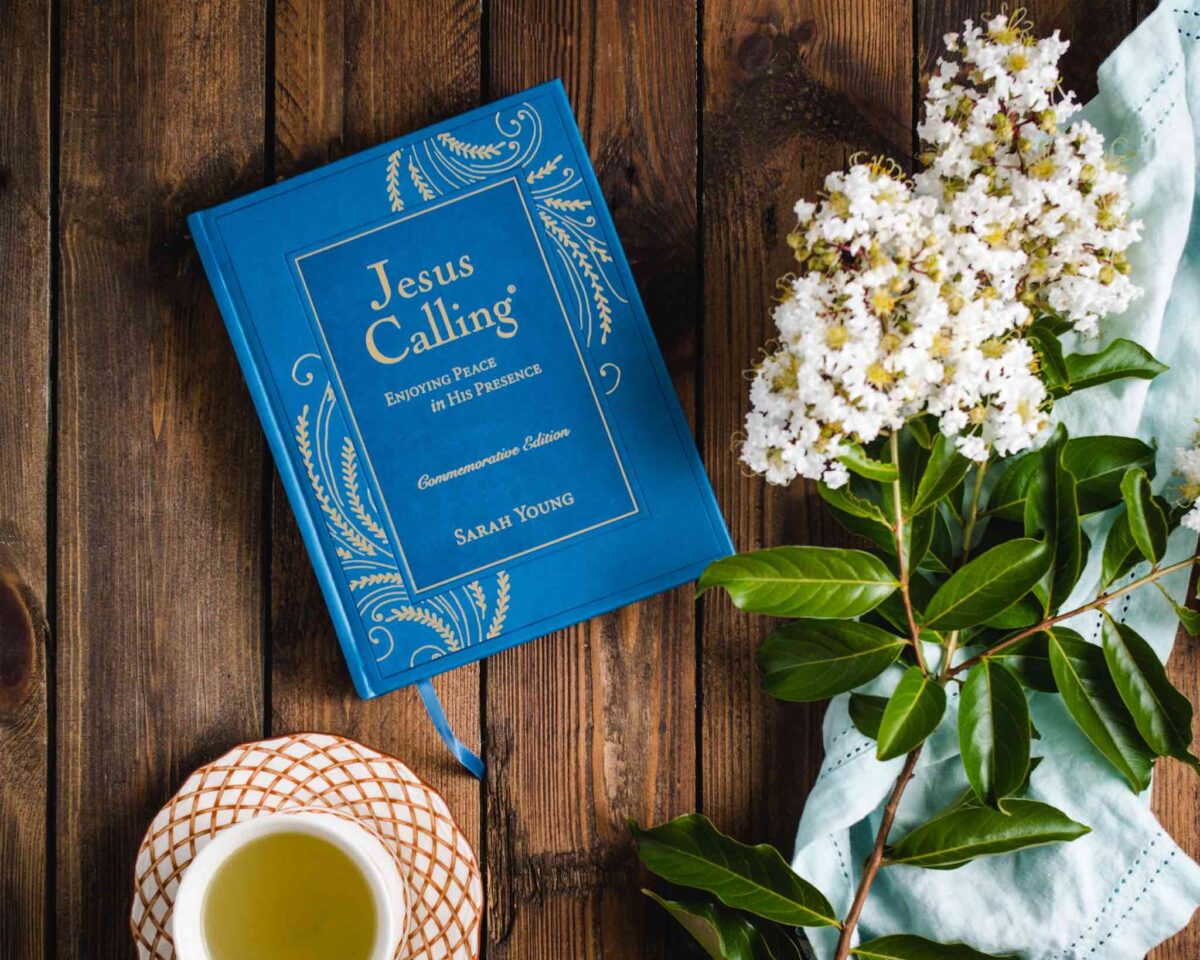
The Jesus Calling brand has impacted more than forty-six million lives, and now, there’s a beautiful commemorative edition that celebrates Jesus Calling and the life of beloved author Sarah Young.
This special edition features a larger, deep blue hardcover with a striking gold foil design on the cover, and includes devotions for every day of the year. Plus, new inspiring work written before Sarah’s passing. You’ll get twelve new bonus devotions and you’ll start each month with a letter from Sarah to her readers.
This special commemorative edition also features moving, personal touches, including a loving essay from Sarah’s daughter celebrating her legacy, and you’ll see samples of Sarah’s handwritten devotionals.
The updated deep blue design and deluxe packaging make this a heartfelt gift for the special people in your life, and the perfect way for you to spend time in the presence of the Savior.
The Jesus Calling commemorative edition is available for pre-order for a limited time.
Our next guest is author and online educator Hannah Brencher, who embarked on a journey of unplugging from tech when she realized it was starting to consume her life. Hannah shares the changes she began to notice when setting healthier boundaries with technology, and how it brought her closer to God in the process.
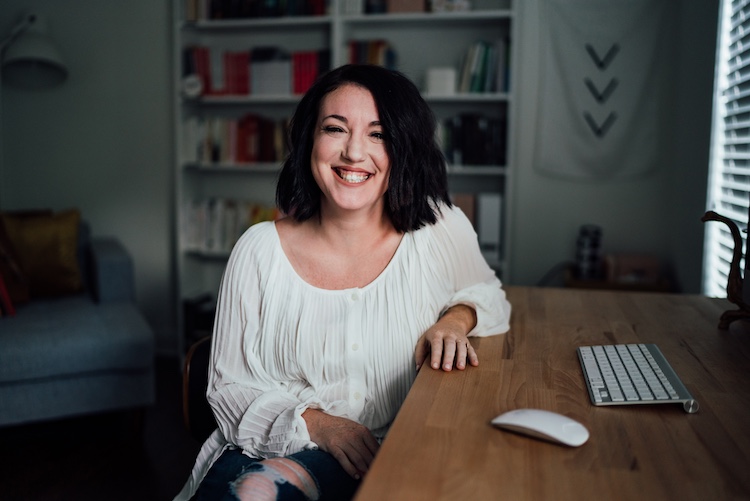
Hannah Brencher: Hi everyone, my name is Hannah Brencher. I am an author, a writer, and an online educator. I am really passionate about teaching people the power of rhythms and routines in daily life for mental health and for our faith. And I am the author of the book The Unplugged Hours, about cultivating a life of deep presence in a digital world.
Technology Use Starts Early
When I was a senior in college is when I started a blog, and from that point forward, I was digitally connected. I was in it, and it wasn’t a bad thing. And it’s still not a bad thing. It’s like one of the most beautiful things and the biggest honor of my life that I can be on the internet. I slowly started to get more connected to my devices, to my email, to just being constantly plugged in.
I felt like a lot of people, like, No, I have to be plugged in, because what if information comes my way that I can’t miss? I think there was a sort of doom scrolling that made me believe that if I just kept scrolling, maybe I would find the solution for things.
But then we’re at the mercy of the things that we see and the way that they make us feel. And so you might be having a great time scrolling, and then somebody pops up that immediately it’s like, Oh gosh, she’s doing that with that person and I wasn’t invited to that. And then all of a sudden your mood is completely tanking and I don’t know about you, but I will then take it out on everybody around me. I’m less patient, then I’m snapping at my husband.
I wasn’t sitting in stillness. If I was sitting in stillness, it was only for these like brief pockets of time, and I feel like my mind was still always onto the next thing. What’s the next thing that’s going to happen? What’s the next thing on the list? And as a result, as a new mom, I found myself looking around and being like, Wait a minute. I feel tired all the time. I feel just like I have notification fatigue. I feel like I’m just not living my most vibrant life that I want to be living. And when I would get to the end of the day, I would kind of just want to numb myself because it was all too much. It was all too much information.
And I remember specifically it was my birthday. I was sitting there and thinking about the goals that I wanted to set for the year ahead. And as I was sitting there in my quiet time, I just felt this nudge that I believe was the Holy Spirit just saying, “Turn off your phone.” And when I heard it, it wasn’t like, “Turn off your phone once and reap all the benefits.” I could tell the obedience part of it would be just like learning to turn off my phone again and again and again. And if I get to the end of my life and I’m anything, I want to be obedient. And so right then and there, I turned off my phone. I kept my phone off for that entire day, and that I felt more myself in that entire day than I had felt in years. And so I immediately knew, Oh, there’s something to this.
The Practice of Unplugging
I am keenly aware that you really can’t manage what you don’t measure. And so it’s a nice thought to be like, I’m just going to turn off my phone more. But, you know, I’ve talked to countless amounts of people that are like, “I want to unplug, I want to power down, but I don’t know how.” And I think that’s because for a lot of us, we don’t really have a benchmark. I feel like the way that we’re talking about unplugging in today’s culture, it’s very much an all or nothing approach. Either you have no social media or you’re just completely plugged in. Either you go off the grid or you just succumb to the constant connectivity. I wasn’t looking to go completely off the grid. I need email, I need things to run my business.
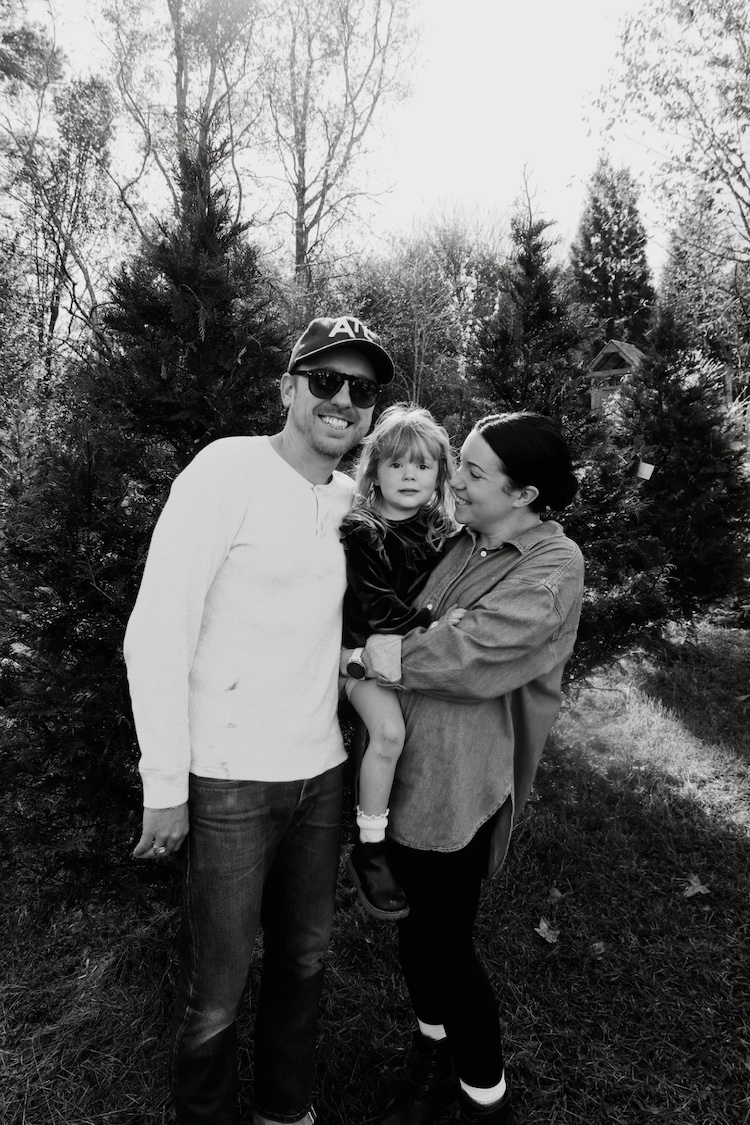
I set a goal of 1,000 hours in a year to see if a balance could be struck. And so 1,000 hours in a year comes out to roughly three to four hours a day. I started planning when I was going to be unplugged. I started carving out that morning time to not have my phone, to not wake up first thing and be on my phone. Most of my unplugged hours were happening in the evening. I would get to the end of the day, and then I would turn off my phone and just be with my family. And that was, and still is, the sweetest time to be able to go through nightly routines and hanging out with one another, not feeling like there’s this constant distraction pulling me away. And then one of the things that I added that stacked up to a lot of unplugged hours was doing a weekly Sabbath. So Friday at sundown till Saturday at sundown, I would be mostly off of my phone. I would check it here and there, but the goal was just to be off of my phone as much as I possibly could be. For twenty-four hours, I’m handing over the keys, I’m choosing to rest, and I’m saying, “God, you are in control.” But I would also feel my spirit being refreshed and feeling like, “Okay, now I’m ready to step back into the week.”
And so what I really wanted to do in that unplugged year was just be present to it for myself, for that part of myself that was exhausted, for that part of myself that needed to get back these vital parts of herself.
“What I really wanted to do in that unplugged year was just be present to it for myself, for that part of myself that was exhausted, for that part of myself that needed to get back these vital parts of herself.” – Hannah Brencher
Accessible vs. Available
When I first started unplugging, I think that was an honesty hour that I had to have with myself. It wasn’t until I started unplugging that I realized, Oh, wow, I’ve needed this. And then I could look back and see, Okay, here’s all of the road signs that are pointing to that exhaustion and that anxiety and what can only be described for me as like this constant race in my mind of just do more, just push more, just do a little bit more. And I didn’t even know who I was racing up against.
Our brains are wired for dopamine. We want dopamine. And so to immediately take out that form of dopamine that you have become so used to is uncomfortable. And I think one of the first feelings that I had to reckon with was almost this feeling of like, I don’t know what to do with my hands. I have to be doing something. I have to be going somewhere. And I just had to learn to just sit and even in little parts, do nothing, which is hard.
I had to come to grips with the fact that when I would get to the end of a long day, especially as a mom, and I would get on my phone, I would say this was my form of self-care. This was my way of checking in. I’ve mommed all day and so I can be on my phone. And the thing is, there’s nothing wrong with that. But I, in my own story, had to come to grips with the reality of like, No, this isn’t checking in and this isn’t self-care. I’m checking out and I’m tired. And so I would rather do this and do something that will feed my soul, or something that will feed my mind, or something that will make me feel good because I got up and moved, or because I read a few pages of a book. And so there’s that adjustment period of like, what would it really look like to check in with myself, and what would it really look like to take care of myself at the end of a long day?
“What would it really look like to check in with myself, and what would it really look like to take care of myself at the end of a long day?” – Hannah Brencher
You have to define what an unplugged hour looks like for you. So there are some people that are like, “You know what? I can still listen to a longform podcast interview and feel like I’m being really present and not scrolling towards other things.” For me personally, unplugged meant the phone was either completely off or it was away. Unplugged meant that I wasn’t on email. But there would be mornings when my daughter would be in school and I can’t just turn off the phone completely. And so what I would do is I would take my phone and I would just put it in a little box. I would have the ringer on in case anybody needed me. But I was done with making the excuse of, Somebody might need me so I can’t unplug, because what I realized was happening was that I was just being accessible, and it was burning me out. And what I really wanted to shift towards was being truly available to my people, which meant I had to take a step back in order to recharge and refuel and find these little junctures to get with God all throughout the day, rather than to just scroll on my phone.
You take it one hour at a time, and with each hour you start to notice things starting to shift and change. You don’t want to have to admit that you’re not holding it all together, or that God doesn’t actually need you to be going twenty-four/seven to hold things together. I’m just realizing, Oh, I can go about my day with my own thoughts, and I can actually experience peace just by taking these little ordinary moments throughout my day and seeing them as an opportunity to meet with God and hear from God.
“I can actually experience peace just by taking these little ordinary moments throughout my day and seeing them as an opportunity to meet with God and hear from God.” – Hannah Brencher
And for me personally, I started to watch my mindset change. I started to watch my thoughts change. I think one of the things that is my favorite is that I have become a more thoughtful, intentional person, which I would say for me, like, that is the goal. That is my biggest hope. The more that I was going by the rhythm of the culture and the do more and the hustle harder, the more I was missing the marks on the things I actually wanted, wanting to be intentional, wanting to be the kind of person that is not too frazzled to bake cookies or cinnamon buns and wanting to be the person that remembers birthdays or just shows up at the door with a bouquet of flowers or a gift. That was the kind of person I realized I wanted to be. And one unplugged hour at a time, I’ve become that person.
Productivity That is Life-giving vs. Draining
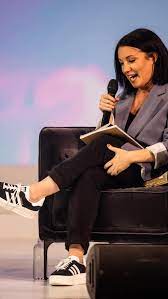
Because I’m not overloaded, because I’m not overstimulated, I’m able to tend to the life that is right here. I’m able to start fixing and changing some of the voices that I have let lead me and guide me to places I didn’t even want to go. I had to start questioning whether or not my definition of productivity was a good one, whether it was one that was actually life-giving, whether it was one from God.
That was a season that I look back on and I think, Wow, we really learned to trust Him in that season. I really became a more patient, grace-filled person in that season. I became so much steadier, like one of those oak trees from the Bible. I learned not to dismiss the seasons where I feel like maybe my plans are not moving forward, or the lists or being left undone, because within that season, things are being produced.
And that has become a quest that I am still on today, and I’m learning new things every day. But now I approach my quiet time and I often pray a prayer, I just say, “God, help me notice something I’ve never noticed before.” Through the unplugging and the daring to notice things I’d never noticed before, I’ve just watched my faith grow in a completely different, vibrant way.
I picked up Jesus Calling I want to say probably about a year and a half ago. And gosh, it’s just like water to a thirsty soul every single morning. And I think the reason for it is that because a lot of the devotions are about presence and they’re about the fact that God is with us. And we need that reminder again and again and again, you know? I’m seeing the golden thread go throughout Jesus Calling. And what’s really beautiful is that I feel like in my daily waking, breathing life, that’s the kind of God that I am encountering. The voice is so similar to what I am reading in Jesus Calling, which makes me feel like, Okay, I’m on the right path. I am listening to the right voices. He’s a God of peace. He’s a God of goodness. He’s a God that wants good for your life, and He’s a God that just wants you to be near. Not for any other motive, but the fact that He loves you and He wants to be with you, and He wants to show you daily life through a lens that maybe you haven’t looked through before.
“He’s a God of peace. He’s a God of goodness. He’s a God that wants good for your life, and He’s a God that just wants you to be near. Not for any other motive, but the fact that He loves you and He wants to be with you, and He wants to show you daily life through a lens that maybe you haven’t looked through before.” – Hannah Brencher
Jesus Listens, March 11th:
My comforting Lord,
Help me find rest in You alone; my hope comes from You. I have a restless mind. It skips and scampers about—rarely taking time to be still. But Your Word instructs me to be still and know that You are God. When I sit quietly in Your Presence, I can hear You saying, “Come to Me, and I will give you rest.
True hope comes from You. False hope comes from many sources, including persuasive advertising. Please give me discernment as I seek to walk along a hopeful path. Many voices call out to me: “This is the way!” Protect me from being deceived while I’m trying to process all the information clamoring for my attention. I’ve found that the best way to break free from information overload is to refocus my thoughts on You. As I rest in Your peaceful Presence, true hope grows within me.
In Your soothing Name, Jesus,
Amen
Narrator: Be sure to check out Hannah’s blog post on the Jesus Calling website about the art of unplugging. Just visit www.jesuscalling.com/blog. And be sure to check out Hannah’s new book, The Unplugged Hours, at your favorite retailer.
If you’d like to hear more stories about slowing down and forming healthy habits, check out our interview with Dusty & Erin Loechner.
Next week: Josh Baldwin
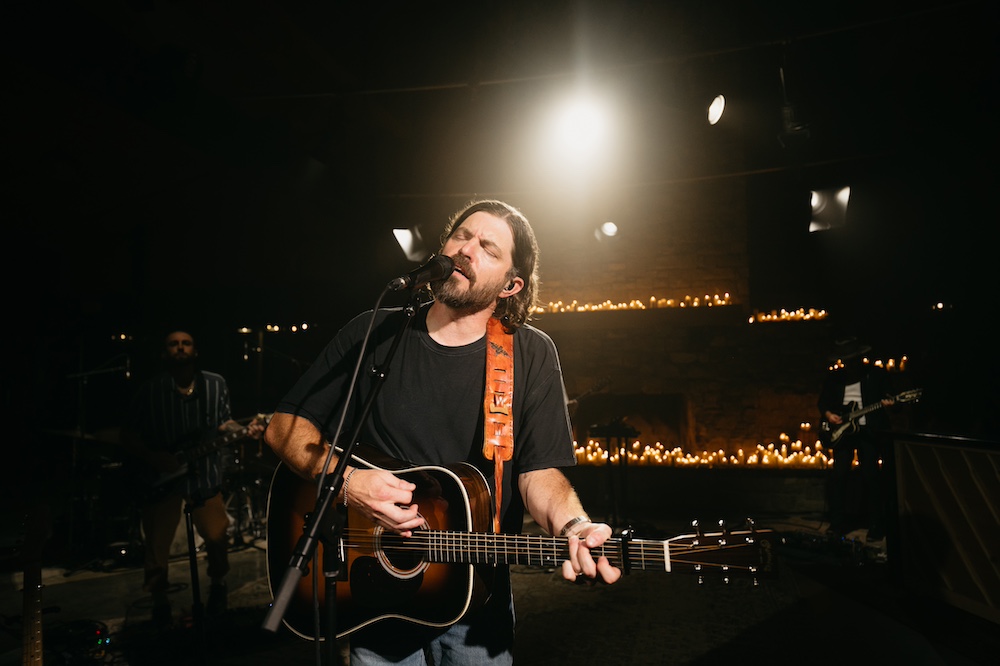
Next time on the Jesus Calling Podcast, we’ll hear from Josh Baldwin of the Bethel Music Collective, who gets candid about his mental health struggles and how mindfulness toward faith and music help with stress and anxiety.
Josh Baldwin: Music has played a huge role in my mental health whether I’ve realized it or not. I think now the older I get, the more I’m aware of, like, Oh, this is an anxious thought or feeling or stress or whatever. I think music, especially music that’s full of Scripture, full of the Word, has a great way of keeping your eyes off of yourself, keeping your mind focused on things from above, focused on the Lord.

